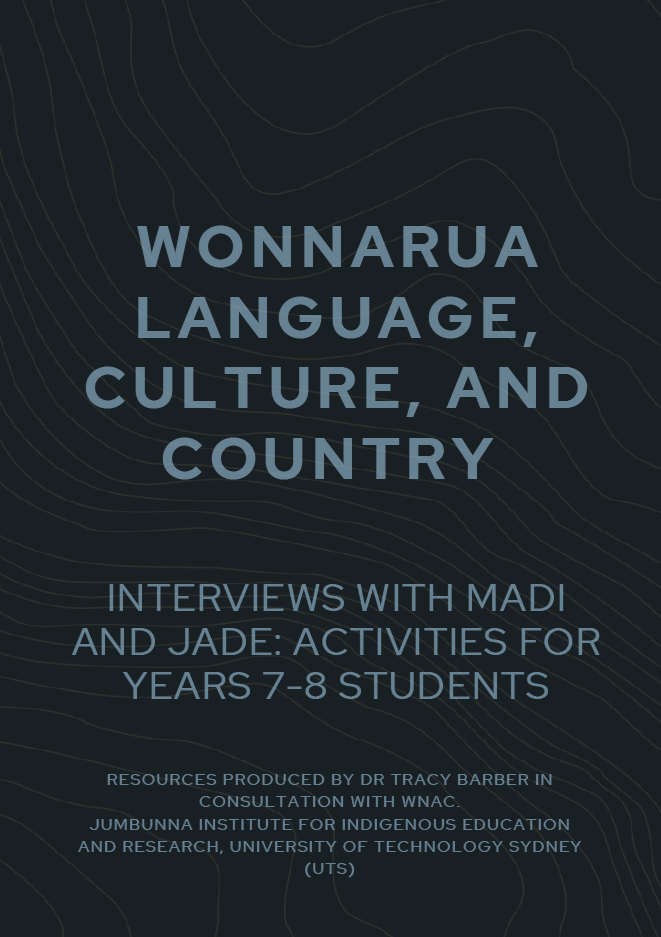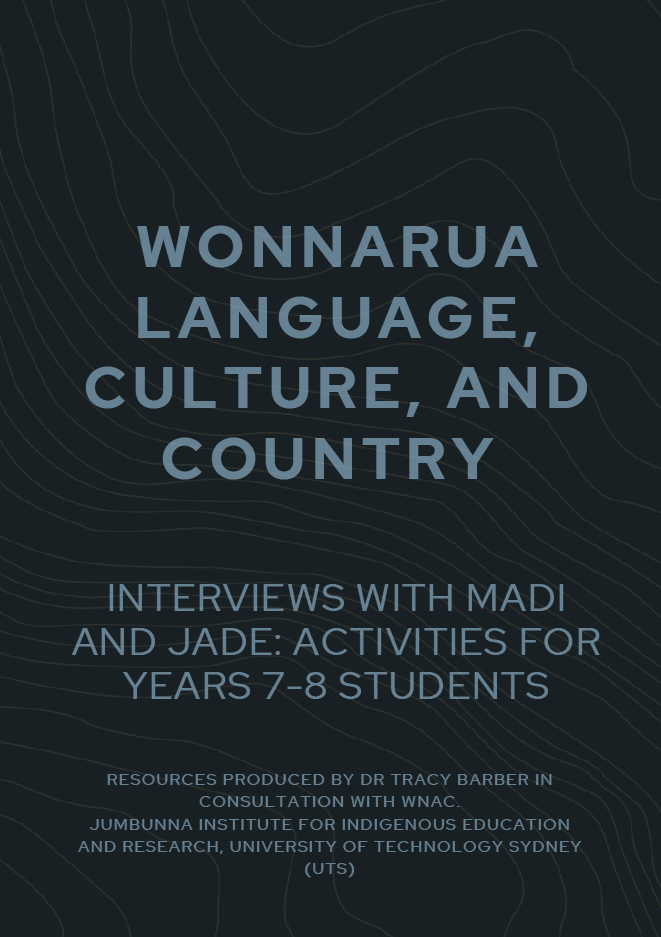Activities for young adults (Years 7-8)
Wonnarua language, culture and Country
Interviews with Madi and Jade: Activities for Years 7-8 students
Overview
This unit provides some possible activities to accompany the video interviews of Jade and Madi. The activities aim to engage learners and build upon the ideas and themes within the interviews. They can be adapted to suit your particular circumstances, whether in a school, home or community setting.
Objectives
The overall objectives of the unit are for students to:
- Engage with Wonnarua language and culture revitalisation through Madi’s and Jade’s stories
- Consider the factors that contribute to identity, including family, community, culture and language
- Consider the social factors that affect Aboriginal identities and experiences including post-invasion impact upon connection to Country and culture, and dispossession of Aboriginal languages.
Duration: 2-3 lessons
Mukurtu resources used in the unit
- Madi and Jade’s interviews
Other resources required throughout the unit
- Computers and internet
- Writing materials
Activities
1. Madi and Jade’s interviews
Before listening to the interviews
Introduce Madi and Jade, explaining they are young Wonnarua women who are sharing their stories about the importance of culture and language. Note that they have given their time do the interviews because these issues are important to them, and that we should be respectful and appreciative to them for their generosity in sharing.
Jade’s interview
Following the interview:
Working in pairs, discuss the following questions:
- Why is language important to Jade?
- What is Jade doing now to learn Wonnarua language?
- What are some of the ideas Jade has for things to do to keep the Wonnarua language alive?
Madi’s interview
Following the interview:
Working in pairs, discuss the following questions:
- Why is language important to Madi?
- When Madi travelled overseas people sometimes asked her ‘why are you brown?’. What did Madi tell them about Indigenous people in Australia and their language and culture?
- What is Madi’s hope for her little sister and other children in the future about learning language?
2) Find out more about Wonnarua culture and language!
i) Students use the WNAC website and other internet sources to learn about:
- Where is Wonnarua Country?
- What are some of the main sites on Wonnarua country, including big towns and landmarks?
- Explore the Wonnarua dictionary on the WNAC website and note some words you would like to share with the group.
- What other things can you discover about Wonnarua culture? For example, what can you learn about myths or sacred sites for the Wonnarua people?
ii) Students make notes about what they learn, and then come back together as a group to share their learnings. This could include class discussions or presentations in pairs or small groups to the larger group.
3) What next?
In collaboration with the students, consider what you might do to learn about and help revitalise Wonnarua or other Indigenous languages. This could include ideas for what could be done in your school and consultation with local community.
Assessment
- Educator observes students’ level of interest and engagement with the activities.
- Students consolidate and demonstrate learning through discussion and sharing amongst the group.
NSW Curriculum links
Aboriginal Studies
AST4-1: Identifies the factors that contribute to an Aboriginal person’s identity
AST4-2: Outlines ways in which Aboriginal Peoples maintain identity
AST4-5: Identifies the importance of families and communities to Aboriginal Peoples
Contributes to core study topic Aboriginal Identities
History
HT4-7: Identifies and describes different contexts, perspectives and interpretations of the past
HT4-8: Locates, selects and organises information from sources to develop an historical inquiry
English
EN4-1A: Responds to and composes texts for understanding, interpretation, critical analysis, imaginative expression and pleasure
EN4-5C: Thinks imaginatively, creatively, interpretively and critically about information, ideas and arguments to respond to and compose texts


